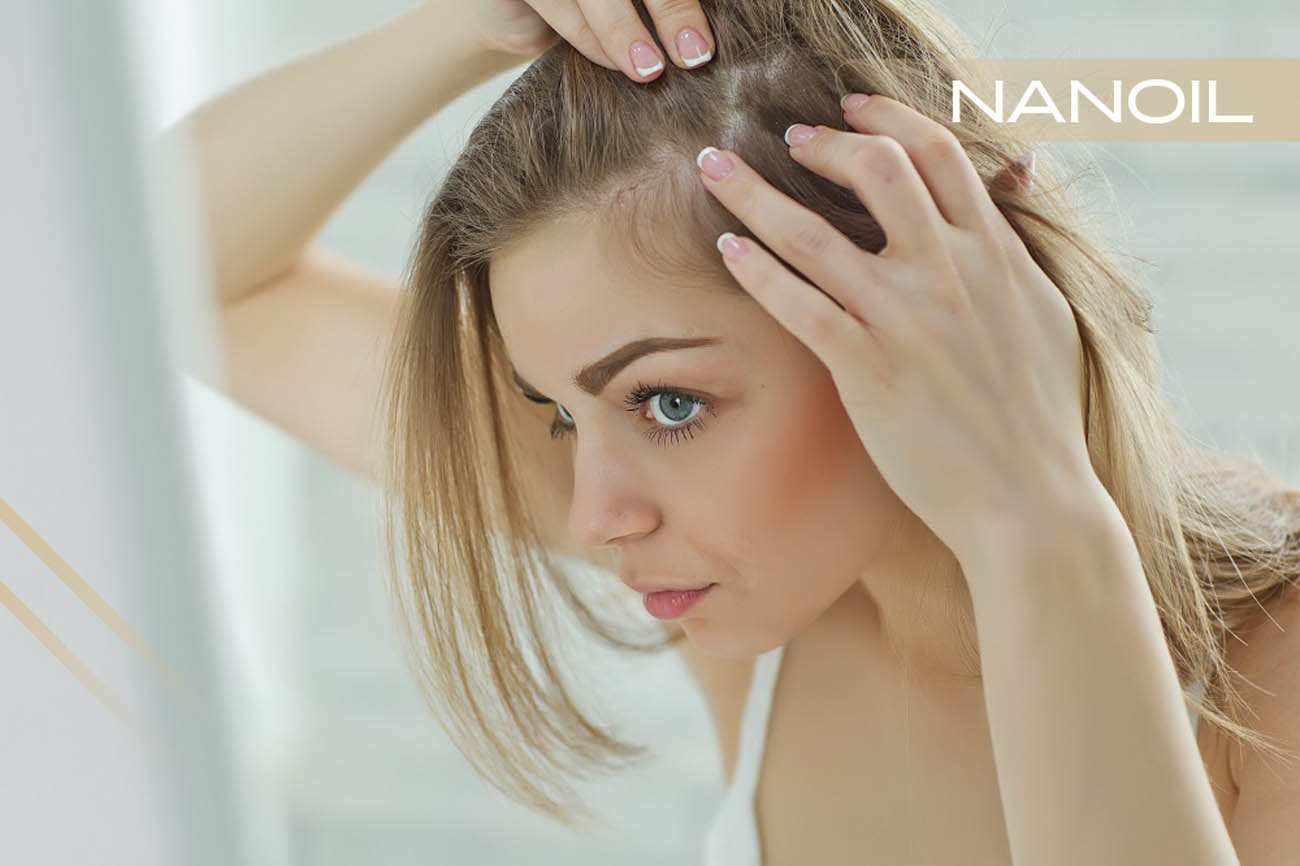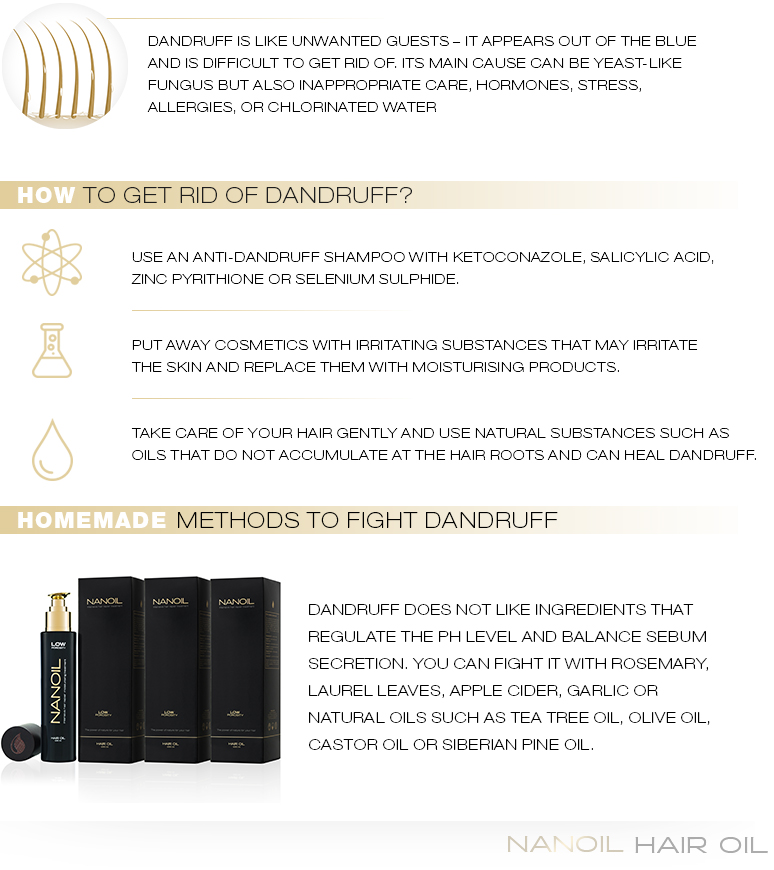- NANOIL Products
- Oils
- Face serums
- Hair masks
- Shampoos
- Hair conditioners
- Hair styling
- Care
- Hair Porosity Test
- Blog
- Contact

Every other person in the world has dandruff yet it’s often just one-off episode. No matter what, hair and scalp affected by dandruff need the right care. Sadly, there’s no recipe because a lot depends on the type of dandruff. Take a look at your hair to find a solution.
You should remember that every bothersome hair problem has its source. There may be lots of reasons and we aim at finding the cause. Let’s take a conscious approach to hair care and start delivering the things the hair truly needs. Then, the problem is going to disappear.
I’m going to sound a bit crazy… everyone has dandruff. Simply put, dandruff equals flaking of the dead skin cells on the scalp.

The human scalp permanently repairs itself and the occurrence of dandruff is perfectly normal. After the life cycle is complete (around 28 days), old skin cells are dead and they’re replaced with new ones. We get rid of the dead cells by exfoliating them e.g. while washing. The problem begins when the skin flakes off in excess; white flakes are visible and fall onto shoulders. Dandruff appears when the life cycle of cells is reduced to 7-15 days and the exfoliation process is faster.
There are three basic types of dandruff:
Yeast fungus (Pityrosporum ovale or Malassezia furfur) is the most common cause of the excessive skin scaling. The fungus occurs naturally in the skin in small amounts. It starts being dangerous when it proliferates in the favorable conditions e.g. greasy hair. Its metabolic products irritate the scalp and disturb the process of epidermis repair. That’s why washing hair rarely may lead to bothersome dandruff.
Still, fungi aren’t the only causes of dandruff. We can treat ourselves to the excessive skin flaking. We’re often unaware we trigger the problem ourselves. Faster and more intensive scaling may be the result of scalp dryness and irritation. The most common dandruff causes include:
Some dermatologists say that genes may cause dandruff, too.
If you don’t treat dandruff, it’s going to be bad for your hairdo. It’s often accompanied by hair thinning. Why so? The hair life cycle is disturbed and hair bulbs are weaker. Consequently, you start going bald. While discussing the problem of dandruff and hair loss, (sadly) I must confirm that the disturbed skin exfoliation and scalp oiliness may lead to an intensified hair thinning.
There are lots of dandruff remedies but as always – it’s better to prevent than treat. Dandruff is a recurring skin condition which is bothersome and very hard to eliminate. That’s why, you should take a good care of your hair and scalp to avoid the problem. The prevention is the key.
1. Keeping the scalp clean matters a lot because the sebum is an ideal environment for the dandruff yeast to develop. A gentle and proper care of oily hair is the key to success because this hair type may quickly ‘get’ dandruff. Let’s avoid going with unwashed hair for several days. Let’s wash the strands whenever it’s necessary.
2. Preventing the dandruff problem means avoiding scalp irritation and dehydration, too. Let’s run away from hot water, harsh towel-drying, sharp hairbrushes, dryer’s hot airflow, coloring, too much heat styling and perm. Let’s choose soothing and moisturising products, and enrich the diet with fruit and vegetables.
If you face up to the dandruff nightmare anyway, add anti-dandruff products to your hair care and get rid of the problem.
The right anti-dandruff shampoo is the game-changing tool in this battle. Cleaning the scalp with traditional products may fail because they don’t contain anti-fungal ingredients and they aren’t dedicated to this hair problem. A good anti-dandruff shampoo should:
Another important tip is connected with how often to wash hair when you have dandruff. You must be aware that an anti-dandruff shampoo won’t be effective if you don’t use it regularly. Cleaning is the most important while fighting dandruff so do it as often as possible. It’s advised to wash hair every day or every other day. At the same time, you must be careful not to strip off the natural protective lipid barrier which could lead to the extremely dry scalp. As a consequence, the body would react by producing too much sebum. If you struggle with dandruff, you should follow two rules while washing your hair. Do it often and use only mild products. You can use a strong anti-dandruff shampoo and a delicate moisturising one alternately for the scalp hydro-lipid balance.
The right hair care – that’s the best remedy for dandruff. Still, despite great efforts, it’s impossible to do away with the problem in just several days. The irritated scalp that has been attacked by the yeast must have time for repair and bringing the exfoliation process back to normal. Patience is welcome.
The right anti-dandruff shampoo lets you eliminate the problem but it’s great if you condition the scalp and hair with extra methods. The proper nourishing and moisturising are crucial. Group B vitamins, vitamins A and E, minerals (found in fish, cheese, brussels sprouts, nuts, sunflower and pumpkin seeds) deliver lots of skin and hair benefits. However, all nutrients work better if you deliver them with cosmetics (conditioner, masks, oils). It’s a far better solution because you work directly on hair and bulbs.
We can reach out for home dandruff remedies.
Comments: #0